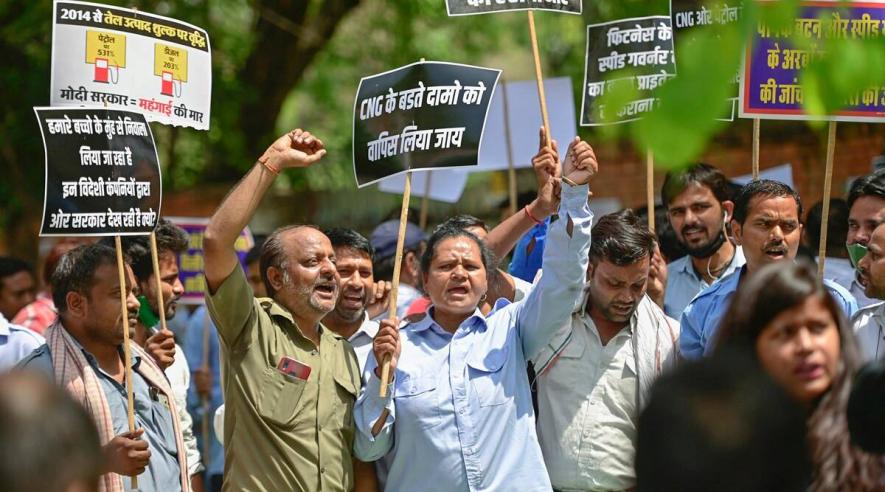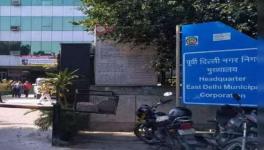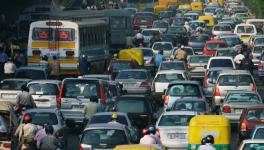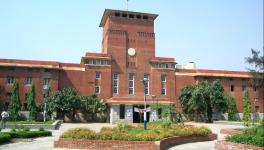As Rising Fuel Prices Strain Wallets, Auto and Cab Drivers Stage Strike in Metropolitan Cities

Image Courtesy: PTI
New Delhi: The outcry of auto-rickshaw drivers and cabbies grows louder as it gets difficult for them to make ends meet, courtesy of the spiralling fuel prices in recent months that have put a strain on the household pocketbooks across the country.
On Monday, the commercial drivers took to the streets as strike actions were staged in several metropolitan cities where slogans were raised against the government machinery and app-based cab aggregators for not providing enough support.
In Delhi-NCR, demanding a subsidy on CNG and a fare revision in the wake of rising fuel prices, various auto-rickshaw, cab, and taxi unions went on strike. Commuters in the city faced difficulties in getting cabs and autos on Monday morning, news agency PTI reported. Though cars were available on Ola and Uber apps, the fares were inflated, it added.
Likewise, in Lucknow, app-based cab drivers also said they are going on strike for two days to press the Uttar Pradesh government to bring the aggregator policy to the state in keeping with the guidelines already issued by the Centre to regulate the cab aggregator market.
Sections of cab drivers also staged a strike action on Monday in Hyderabad, Mumbai, and Kolkata, informed Shaik Salauddin, national president, Indian Federation of App-Based Transport Workers (IFAT). He told Newsclick that at some places, the strike would be staged for “two days,” while at other sites, it can be extended further depending upon the local situation.
The decision of the commercial drivers to stop plying their vehicles on the road in protest has come in the wake of rising prices of petrol, diesel, and CNG in the country. For example, the price of CNG, which commercial drivers most commonly use, was hiked recently by Rs 2.5 in the national capital. This is the third price hike in April and the 11th since March 7. CNG now costs Rs 71.61/kg.
Similar hikes in fuel prices in other cities have now resulted in the incomes of the taxi drivers getting depleted, union leaders say. They added that it is more worrying since many of the drivers were yet to come out of the financial burden inflicted upon them due to the pandemic-induced lockdown measures.
“The drivers are fighting for the survival of their families,” Kamaljeet Gill, president of Sarvodaya Driver Association of Delhi, told Newsclick in a telephonic interview on Monday. “We have been facing difficulties for many years now. However, we cannot even continue like this now anymore, Gill said.
Gill, whose union represents “Ola-Uber drivers” in the national capital, flayed the app-based cab aggregators for charging “high commission rates.” According to him, the high commission rates, translating to up to 25% to 30%, mean that even if fares are inflated, it does not leave the driver with any sustainable income.
Recently, Uber India had increased the trip fares in the National Capital Region by 12%.
Sanjay Samrat, the president of Delhi Taxi Tourist Transporters and Tour Operators Association, told Newsclick that the demands of the drivers are “very clear.” “We want a 50% subsidy on CNG rates and revision of fares of autos and taxis in the city,” he said.
Auto-rickshaw fares in Delhi were last revised in 2019 and officially notified in 2020. Currently, the auto fare is Rs 25 for the first two km and Rs 8 per km for every additional km thereafter. Meanwhile, for pre-paid (black-yellow) taxis, the current fares are set while taking only Rs 52/kg as the price of CNG, Promod Kumar, the president of Delhi Airport Taxi Union, told Newsclick.
Notably, last week, Delhi transport minister Kailash Gahlot announced the formation of a committee to consider fare revision in a time-bound manner. In a tweet on Friday, Gahlot said that the Arvind Kejriwal-led Aam Aadmi Party government understands the concerns of the auto and taxi unions in the city.
“We don’t want a committee but a solution to our problems. We want the government to talk to us and make a decision to save the lives of drivers immediately,” Gill said.
Mohammad Amir, the president of Independent App-based Cab and Drivers Association – Uttar Pradesh, told Newsclick that fares in Lucknow city were last revised when the price of CNG was around Rs 45/kg in the city. “Now it's over Rs 80/kg,” he said.
He also demanded the UP government to immediately introduce an aggregator policy along the lines of the Motor Vehicle Aggregator Guidelines, 2020, issued by the Union Ministry of Road Transport and Highways.
According to media reports, such a policy is already being prepared by state officials in UP. Under the policy, an aggregator will require a licence from the transport department to provide services, and the licence will be subject to suspension and cancellation for not complying with the rules laid down in the policy.
Get the latest reports & analysis with people's perspective on Protests, movements & deep analytical videos, discussions of the current affairs in your Telegram app. Subscribe to NewsClick's Telegram channel & get Real-Time updates on stories, as they get published on our website.
























